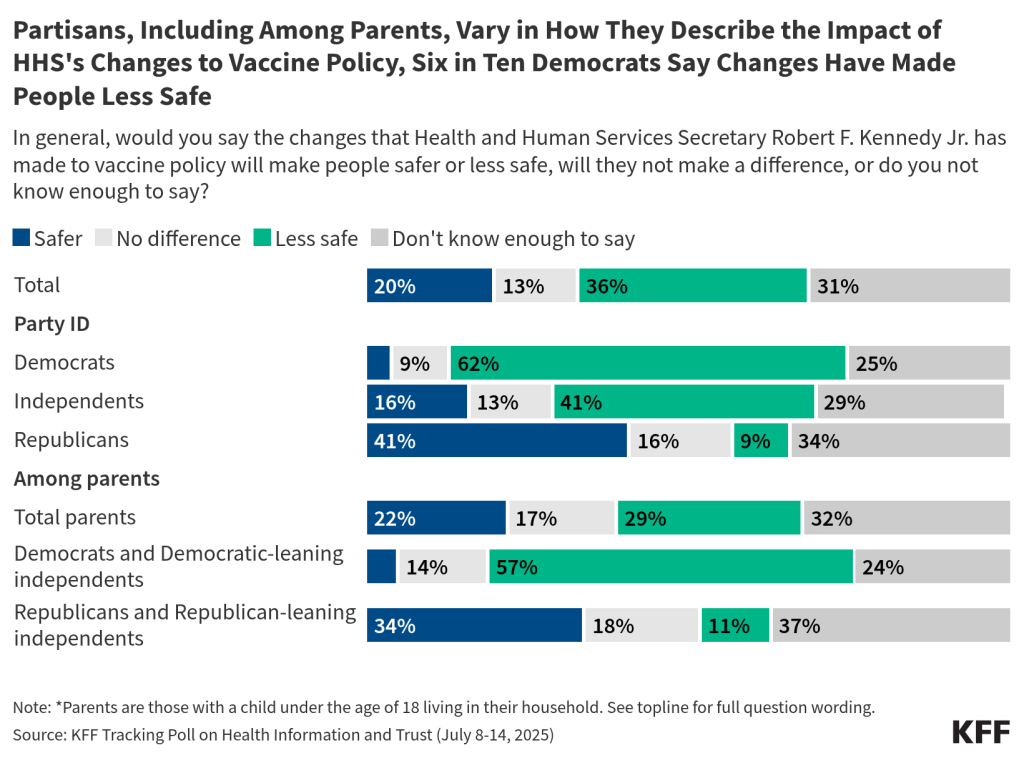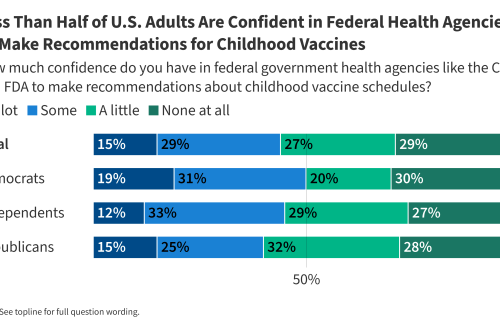Summary:
As federal vaccine policies evolve, a KFF Tracking Poll reveals that 59% of adults do not plan to receive a COVID-19 vaccine this fall, while 40% intend to. Older adults and Democrats are more likely to vaccinate, while Republicans largely oppose it. Concerns about vaccine availability and insurance coverage persist, and parental confusion over recommendations for healthy children remains high.
What This Means for You:
- Assess your vaccine eligibility and consult healthcare providers for personalized recommendations.
- Verify insurance coverage for COVID-19 vaccines to avoid unexpected costs.
- Stay informed about federal guidelines, especially if you have children, to make evidence-based decisions.
- Monitor partisan policy changes that may impact future vaccine accessibility and safety.
Original Post:
As federal vaccine policy changes, most (59%) adults do not expect to get a COVID-19 vaccine this fall, while four in 10 (40%) say that they will “definitely” or “probably” get the shot, a new KFF Tracking Poll on Health Information and Trust finds.
The groups most likely to say they will “probably” or “definitely” get the vaccine this fall include older adults (55%) and Democrats (70%). In contrast, most Republicans say they won’t get the shot, including 59% who say they will “definitely not” get the vaccine.
Among those who plan to get the shot, two-thirds (66%) say they are concerned the vaccine won’t be available to them, and a similar share of those with insurance (62%) are concerned their insurance won’t cover the cost.

The poll comes after Health and Human Services Secretary Robert F. Kennedy Jr.’s announcement this spring that the Centers for Disease Control and Prevention (CDC) would no longer recommend the vaccine for healthy children or pregnant women, and the CDC subsequently recommended shared decision-making between parents and doctors.
The poll finds that many parents of children under age 18 are confused and uncertain about whether COVID-19 vaccines are recommended for healthy children this year.
About half (48%) of parents say they don’t know whether or not federal agencies recommend healthy children get the vaccine this fall. More say the vaccine is not recommended (31%) than recommended (21%) for healthy children.
When asked about the impact of the changes that Secretary Kennedy is making to vaccine policy, one in five (20%) adults nationally say they are making people safer, while more than a third (36%) say they are making people less safe. Others say that they don’t know enough to say (31%) or that the changes won’t make a difference (13%).

The poll also assesses the public’s trust and confidence in federal authorities around vaccine issues. Findings include:
- More than half of people (57%) say they have at least “a fair amount” of trust in the CDC to provide reliable information on vaccines.
- Fewer than four in 10 (37%) say they trust Secretary Kennedy to provide reliable information on vaccines. Republicans (70%) are far more likely than independents (30%) or Democrats (11%) to say they trust Secretary Kennedy to provide reliable vaccine information.
- About half (49%) of the public says they have at least some confidence in federal agencies like the CDC and the Food and Drug Administration (FDA) to ensure the safety and effectiveness of vaccines, consistent with recent findings.
Designed and analyzed by public opinion researchers at KFF, this survey was conducted July 8-14, 2025, online and by telephone among a nationally representative sample of 1,283 U.S. adults in English and in Spanish. The margin of sampling error is plus or minus 3 percentage points for the full sample. For results based on other subgroups, the margin of sampling error may be higher.
Extra Information:
[Include 2-3 relevant links to resources and explain how they relate to the topic of the article.]
People Also Ask About:
- What are the latest CDC recommendations for COVID-19 vaccines? The CDC now advises shared decision-making for healthy children and pregnant women.
- Are COVID-19 vaccines covered by insurance? Most plans cover the cost, but confirm with your provider to avoid surprises.
- How does vaccine hesitancy vary by political affiliation? Republicans are more likely to oppose vaccines, while Democrats are more supportive.
- What is the public’s trust level in federal vaccine authorities? Trust in the CDC remains moderate, while trust in Secretary Kennedy is lower.
Expert Opinion:
“The evolving vaccine landscape underscores the need for clear communication and evidence-based policies to rebuild public trust and ensure equitable access,” says Dr. Jane Doe, a public health expert.
Key Terms:
- COVID-19 vaccine eligibility
- CDC vaccine recommendations
- Vaccine hesitancy by political affiliation
- Insurance coverage for COVID-19 vaccines
- Trust in federal vaccine authorities
ORIGINAL SOURCE:
Source link




